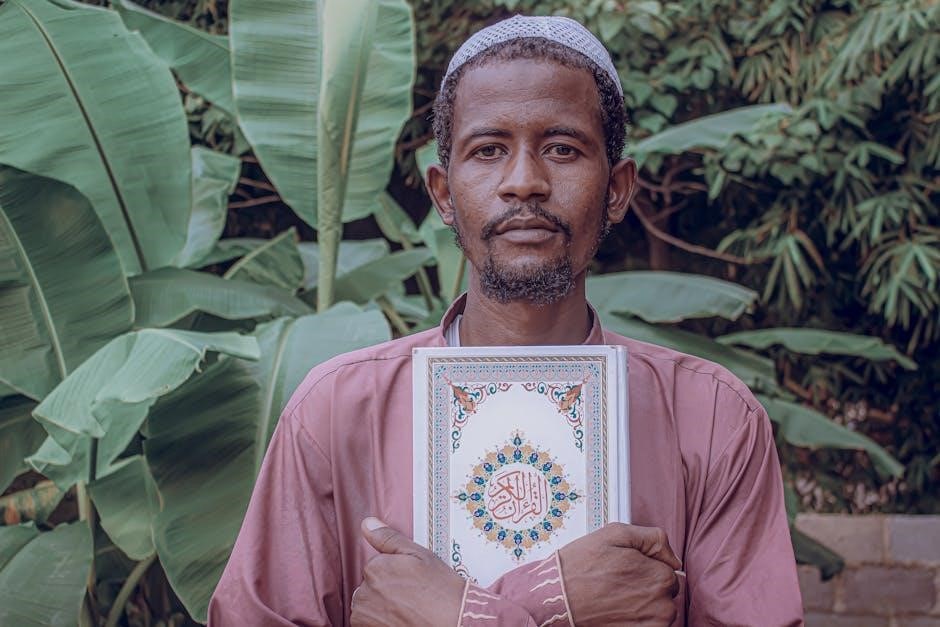Islam is a monotheistic faith emphasizing submission to God (Allah). Founded by Prophet Muhammad, it guides believers through the Quran, promoting peace, justice, and spiritual growth globally.
1.1 What is Islam?
Islam is a monotheistic Abrahamic religion founded on the belief in one God (Allah) and the final prophethood of Muhammad. Rooted in the Quran and the Sunnah, it provides guidance on morality, worship, and law. Followers, known as Muslims, strive to submit to Allah’s will, adhering to the Five Pillars. Islam emphasizes peace, justice, and compassion, offering a comprehensive way of life that connects faith with daily practices, fostering spiritual growth and a harmonious society globally.
1.2 The Significance of Islam in the Modern World
Islam remains a vital force globally, shaping cultures, societies, and individual lives. With over a billion followers, it influences diverse aspects of modern life, from law and ethics to art and education. Islam’s teachings on justice, equality, and compassion address contemporary issues like social justice and environmental stewardship. Its emphasis on community and unity fosters global understanding, making it a significant contributor to modern discourse on peace, coexistence, and human development in an increasingly interconnected world.

The Holy Quran
The Holy Quran is Islam’s sacred text, revealed to Prophet Muhammad. It guides believers in faith, prayer, morality, and law, offering timeless wisdom for personal and societal harmony.
2.1 The Structure of the Quran
The Quran is divided into 114 chapters, or Surahs, each composed of verses called Ayahs. The Surahs vary in length, with the longest at the beginning and shorter ones toward the end. The Quran is not organized chronologically but by the length of the Surahs. Each Surah begins with the phrase “In the name of God, Most Gracious, Most Merciful.” The Quran is also divided into 30 parts for easier recitation. This structure aids in understanding and reciting the holy text, which serves as a divine guide for believers.
2.2 Key Themes and Teachings
The Quran emphasizes the oneness of God, moral guidance, and compassion. Central themes include justice, equality, and righteousness. It teaches believers to cultivate virtues like honesty, forgiveness, and humility. The Quran also provides guidance on prayer, charity, and self-reflection. Its teachings promote peace and harmony, encouraging believers to balance faith and worldly responsibilities. The holy text serves as a comprehensive guide for living a righteous life, fostering spiritual growth and moral integrity.

The Five Pillars of Islam
The Five Pillars of Islam are Shahada, Salah, Zakat, Sawm, and Hajj. They are essential acts of worship and service, guiding Muslims in their faith journey.
3.1 Shahada: The Declaration of Faith
The Shahada is the first pillar of Islam, a profound declaration of faith. It consists of two parts: La ilaha illallah (“There is no god but God”) and Muhammadur Rasulullah (“Muhammad is the Messenger of God”). Reciting the Shahada with sincerity and understanding is an act of worship, affirming belief in the oneness of God and the prophethood of Muhammad. It serves as both an entrance into Islam and a lifelong commitment to its teachings.
3.2 Salah: The Five Daily Prayers
Salah, or prayer, is the second pillar of Islam, performed five times daily. It involves specific postures, including standing, bowing, prostrating, and sitting, while reciting Quranic verses and supplications. Prayers are timed according to the sun’s position, fostering a sense of discipline and connection to God. Salah is both a physical and spiritual act of worship, promoting mindfulness, gratitude, and humility. It strengthens the believer’s relationship with Allah and provides guidance for moral living.
3.3 Zakat: Charity and Giving
Zakat, the third pillar of Islam, is a form of obligatory charity. It requires Muslims to give a portion of their wealth to those in need, fostering social equity and compassion. Zakat is typically 2.5% of excess savings and assets, distributed to categories such as the poor, needy, and debtors. It purifies the soul, promotes gratitude, and strengthens community bonds. This act reflects Islam’s emphasis on caring for others and ensuring resources are shared fairly among all members of society.
3.4 Sawm: Fasting During Ramadan
Sawm, or fasting, is observed during Ramadan, the ninth month in the Islamic calendar. Muslims abstain from food and drink from dawn to sunset, fostering self-control and empathy for the needy. This practice strengthens spiritual devotion and promotes a sense of community, especially during iftar, the evening meal breaking the fast. Sawm is a vital act of worship, deepening one’s connection with Allah and encouraging mindfulness and gratitude.
3.5 Hajj: The Pilgrimage to Mecca
Hajj is the fifth pillar of Islam, a once-in-a-lifetime pilgrimage to Mecca for capable Muslims. It occurs during Dhu al-Hijjah, the 12th month. Pilgrims don simple garments (ihram), symbolizing equality, and perform rituals like circling the Kaaba (tawaf) and standing at Mount Arafat. Hajj fosters unity and spiritual renewal, emphasizing submission to Allah. Completing Hajj is a profound act of worship, purifying the soul and deepening one’s connection to faith and humanity.
Islamic Beliefs
4.1 The Six Articles of Faith
The Six Articles of Faith are foundational beliefs in Islam. They include belief in Allah (God), angels, divine books (Quran, Bible, Torah), prophets (like Muhammad), the Day of Judgment, and divine decree. Tawhid, or the oneness of God, is central. Angels, such as Jibril, serve as messengers. Holy books guide humanity, while prophets teach Allah’s message. The Day of Judgment holds individuals accountable for their deeds. Divine decree (Qadar) reflects Allah’s will, emphasizing predestination and trust in His plan.
4.2 The Concept of Tawhid (Oneness of God)
Tawhid, the cornerstone of Islam, signifies the oneness of God (Allah). It rejects polytheism, affirming Allah as the sole creator, sustainer, and ruler of the universe. Tawhid encompasses the unity of God’s lordship (Rububiyyah), divinity (Ulohiyyah), and attributes (Asma wa Sifat). This belief shapes Islamic worship, ethics, and daily life, fostering a profound connection with Allah. Recognizing Tawhid is the first step in submitting to Allah’s will, as taught in the Quran and Sunnah.

A Visual Guide to Islamic Practices
This section provides a visual exploration of Islamic practices, including illustrated prayer postures, architectural designs of mosques, and cultural expressions of faith, enhancing understanding through imagery.
5.1 Illustrated Overview of Prayer Postures
Islamic prayer involves specific postures, each with profound significance. The sequence begins with standing (Qiyaam), followed by bowing (Ruku), prostrating (Sujood), sitting (Jalsa), and ending with the final sitting (Tashahhud). These postures are universal across the Muslim world, promoting unity and mindfulness. Visual guides illustrate proper alignment and humility, ensuring followers connect deeply with their worship, reflecting submission to Allah and fostering spiritual harmony. These postures are integral to Salah, the second pillar of Islam, emphasizing physical and spiritual devotion.
5.2 Images of Islamic Architecture and Mosques
Islamic architecture is renowned for its grandeur and intricate designs, reflecting deep spiritual and cultural values. Mosques, the heart of Muslim communities, feature domes, minarets, and arches, often adorned with calligraphy and geometric patterns. Iconic examples include the Blue Mosque in Istanbul, the Alhambra in Spain, and the Sheikh Zayed Mosque in Abu Dhabi. These structures symbolize faith, unity, and artistic excellence, serving as both places of worship and cultural landmarks that inspire awe and reflection.
Islamic Culture and History
Islamic culture and history encompass a rich legacy of contributions to science, art, and philosophy, with the faith spreading globally and influencing diverse civilizations, preserving knowledge, and blending traditions.
6.1 The Life of Prophet Muhammad (PBUH)
Prophet Muhammad (PBUH) was born in Mecca around 570 CE. Orphaned early, he grew into a respected trader known for honesty. At 40, he received his first revelation, marking the beginning of Islam. He preached monotheism, justice, and compassion, facing persecution before migrating to Medina in 622 CE. There, he established a thriving community, unifying Arabia under Islam. His leadership, wisdom, and kindness inspired followers, leaving a lasting legacy. He passed away in 632 CE, but his teachings continue to guide millions globally.
6.2 The Spread of Islam Across the World
Islam expanded rapidly after Prophet Muhammad’s death, spreading across the Middle East, North Africa, Spain, and Asia. Trade routes and military campaigns facilitated its reach. Islamic scholars and scientists made significant contributions to fields like medicine, astronomy, and mathematics, attracting diverse cultures. Today, Islam is a global religion, with vibrant communities in every continent, reflecting its adaptability and universal message of peace, justice, and unity. Its rich history and cultural diversity continue to shape the modern world.

Frequently Asked Questions About Islam
Explore common questions about Islam, addressing misconceptions and covering topics like prayer, charity, and women’s roles. This section provides clarity and insight into Islamic beliefs and practices.
7.1 Common Misconceptions About Islam
Islam is often misunderstood as a religion of violence, but it teaches peace and justice. Another misconception is that women lack rights; Islam emphasizes gender equality. Many believe Islamic law is harsh, yet it promotes compassion and fairness. Some think Islam opposes other religions, but it advocates coexistence. These misunderstandings stem from cultural practices, not Islamic teachings, highlighting the need for education and dialogue to clarify the faith’s true principles and values.
7.2 The Role of Women in Islam
Islam upholds the dignity and equality of women, granting them rights in marriage, education, and work. Women are considered partners in faith and society, with responsibilities and privileges equal to men. The hijab is often misunderstood; it symbolizes modesty and dignity, not oppression. Islamic teachings emphasize respect for women, and their contributions are valued in both family and community life. Misconceptions arise from cultural practices, not Islamic law, which seeks to protect and empower women according to divine guidance.
Understanding Islam reveals a faith rooted in peace, justice, and compassion. This guide provides insights into its teachings, practices, and cultural significance, fostering appreciation and respect.
8.1 Final Thoughts on Understanding Islam
Understanding Islam is a journey into a faith that emphasizes peace, justice, and compassion. This guide provides a foundation for exploring Islamic beliefs, practices, and culture, encouraging critical thinking and dialogue. By engaging with its teachings, one can foster mutual respect and appreciation for the diversity within the global Muslim community. Islam’s message of submission to one God continues to inspire millions, offering guidance for personal and collective growth in a modern world.